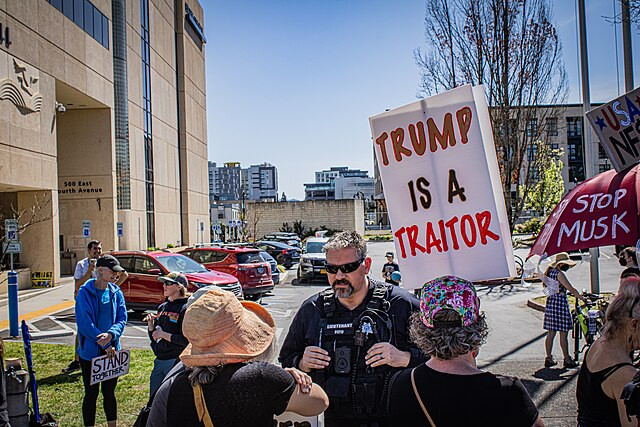Opponents of President Donald Trump's administration staged nationwide protests Saturday, voicing concerns over immigration enforcement, executive overreach, and the downsizing of the federal government. Demonstrations unfolded in cities from New York to San Francisco and smaller communities including Concord, Massachusetts, and Anchorage, Alaska, reflecting what organizers described as mounting fear that democratic institutions are under threat.
In Manhattan, protesters marched north from the New York Public Library to Trump Tower, chanting "No fear, no hate, no ICE in our state," in protest of U.S. Immigration and Customs Enforcement. A banner reading "Impeach & Remove" was spelled out in human letters on a beach in San Francisco, while in Portland, Oregon, thousands marched through downtown with signs and flags, some held upside down to signal national distress.
Events also took on historical symbolism. At a Revolutionary War reenactment in Concord, Massachusetts-marking the 250th anniversary of the battles of Lexington and Concord-demonstrators blended colonial imagery with modern political grievances. Thomas Bassford, an 80-year-old retired mason from Maine, stood with his daughter and grandsons. "This is a very perilous time in America for liberty," Bassford said. "I wanted the boys to learn about the origins of this country and that sometimes we have to fight for freedom."
George Bryant, a Boston resident holding a sign that read "Trump fascist regime must go now!" said he feared the creation of a "police state." "He's defying the courts. He's kidnapping students. He's eviscerating the checks and balances," Bryant said. "This is fascism."
Protesters in Washington gathered near the White House, where Bob Fasick, a 76-year-old retired federal worker, said he was motivated by concerns about due process and threats to Social Security. "If I don't do anything and everybody doesn't do something to change this," he said, "the world that we collectively are leaving for the little children... is simply not one that I would want to live."
Many protests targeted the growing influence of Elon Musk, a top Trump adviser leading the Department of Government Efficiency. Demonstrations were staged outside Tesla dealerships, citing Musk's role in mass layoffs and department closures. Other actions included food drives and teach-ins, aiming to channel opposition into local service.
Melinda Charles, attending a protest in Connecticut, said she worries about the erosion of constitutional safeguards. "We're supposed to have three equal branches of government," she said. "And to have the executive branch become so strong, I mean it's just unbelievable."
The protests were the second nationwide wave in April, part of more than 1,200 events organized by coalitions including civil rights groups, labor unions, veterans, and LGBTQ organizations. Organizers cited what they described as Trump's civil rights violations, mass deportations, and use of the 1798 Alien Enemies Act to justify immigration enforcement.
Marshall Green of Morristown, New Jersey, said the president's use of the wartime-era law was alarming. "Congress should be stepping up and saying no, we are not at war," he said. "You cannot deport people without due process, and everyone in this country has the right to due process no matter what."
In Anchorage, demonstrators held colonial-themed signs with slogans like "No Kings" and "The Feudal Age is OVER." Other protesters carried handmade placards cataloging grievances: threats to LGBTQ rights, shuttered Social Security offices, and weakened healthcare protections.






